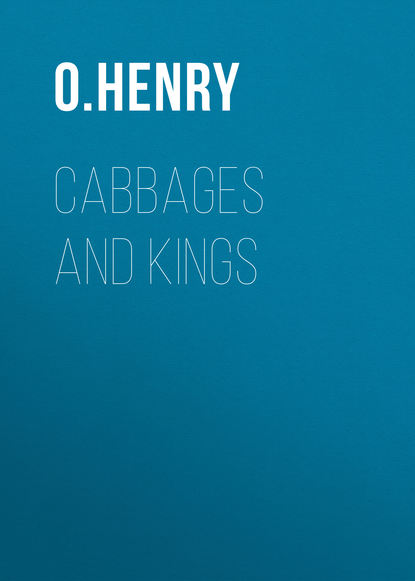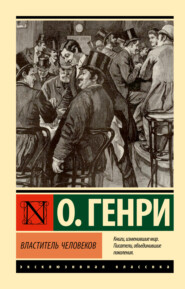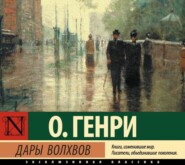По всем вопросам обращайтесь на: info@litportal.ru
(©) 2003-2025.
✖
Cabbages and Kings
Настройки чтения
Размер шрифта
Высота строк
Поля
"With that head of hair! Keep away from the women! And a Maloney! Hasn't he got a license? But, nonsense aside, what do you think of the prospects? It's a species of filibustering out of my line."
Vincenti glanced again at Dicky's head and smiled.
"Rouge et noir," he said. "There you have it. Make your play, gentlemen. Our money is on the red."
"The lad's game," said Cronin, with a commending look at the tall, easy figure by the steps. "But 'tis all like fly-by-night theatricals to me. The talk's bigger than the stage; there's a smell of gasoline in the air, and they're their own audience and scene-shifters."
They ceased talking, for General Pilar had descended from the first carriage and had taken his stand upon the top step of Casa Morena. As the oldest member of the cabinet, custom had decreed that he should make the address of welcome, presenting the keys of the official residence to the president at its close.
General Pilar was one of the most distinguished citizens of the republic. Hero of three wars and innumerable revolutions, he was an honoured guest at European courts and camps. An eloquent speaker and a friend to the people, he represented the highest type of the Anchurians.
Holding in his hand the gilt keys of Casa Morena, he began his address in a historical form, touching upon each administration and the advance of civilization and prosperity from the first dim striving after liberty down to present times. Arriving at the régime of President Losada, at which point, according to precedent, he should have delivered a eulogy upon its wise conduct and the happiness of the people, General Pilar paused. Then he silently held up the bunch of keys high above his head, with his eyes closely regarding it. The ribbon with which they were bound fluttered in the breeze.
"It still blows," cried the speaker, exultantly. "Citizens of Anchuria, give thanks to the saints this night that our air is still free."
Thus disposing of Losada's administration, he abruptly reverted to that of Olivarra, Anchuria's most popular ruler. Olivarra had been assassinated nine years before while in the prime of life and usefulness. A faction of the Liberal party led by Losada himself had been accused of the deed. Whether guilty or not, it was eight years before the ambitious and scheming Losada had gained his goal.
Upon this theme General Pilar's eloquence was loosed. He drew the picture of the beneficent Olivarra with a loving hand. He reminded the people of the peace, the security and the happiness they had enjoyed during that period. He recalled in vivid detail and with significant contrast the last winter sojourn of President Olivarra in Coralio, when his appearance at their fiestas was the signal for thundering vivas of love and approbation.
The first public expression of sentiment from the people that day followed. A low, sustained murmur went among them like the surf rolling along the shore.
"Ten dollars to a dinner at the Saint Charles," remarked Mr. Vincenti, "that rouge wins."
"I never bet against my own interests," said Captain Cronin, lighting a cigar. "Long-winded old boy, for his age. What's he talking about?"
"My Spanish," replied Vincenti, "runs about ten words to the minute; his is something around two hundred. Whatever he's saying, he's getting them warmed up."
"Friends and brothers," General Pilar was saying, "could I reach out my hand this day across the lamentable silence of the grave to Olivarra 'the Good,' to the ruler who was one of you, whose tears fell when you sorrowed, and whose smile followed your joy – I would bring him back to you, but – Olivarra is dead – dead at the hands of a craven assassin!"
The speaker turned and gazed boldly into the carriage of the president. His arm remained extended aloft as if to sustain his peroration. The president was listening, aghast, at this remarkable address of welcome. He was sunk back upon his seat, trembling with rage and dumb surprise, his dark hands tightly gripping the carriage cushions.
Half rising, he extended one arm toward the speaker, and shouted a harsh command at Captain Cruz. The leader of the "Flying Hundred" sat his horse, immovable, with folded arms, giving no sign of having heard. Losada sank back again, his dark features distinctly paling.
"Who says that Olivarra is dead?" suddenly cried the speaker, his voice, old as he was, sounding like a battle trumpet. "His body lies in the grave, but to the people he loved he has bequeathed his spirit – yes, more – his learning, his courage, his kindness – yes, more – his youth, his image – people of Anchuria, have you forgotten Ramon, the son of Olivarra?"
Cronin and Vincenti, watching closely, saw Dicky Maloney suddenly raise his hat, tear off his shock of red hair, leap up the steps and stand at the side of General Pilar. The Minister of War laid his arm across the young man's shoulders. All who had known President Olivarra saw again his same lion-like pose, the same frank, undaunted expression, the same high forehead with the peculiar line of the clustering, crisp black hair.
General Pilar was an experienced orator. He seized the moment of breathless silence that preceded the storm.
"Citizens of Anchuria," he trumpeted, holding aloft the keys to Casa Morena, "I am here to deliver these keys – the keys to your homes and liberty – to your chosen president. Shall I deliver them to Enrico Olivarra's assassin, or to his son?"
"Olivarra! Olivarra!" the crowd shrieked and howled. All vociferated the magic name – men, women, children and the parrots.
And the enthusiasm was not confined to the blood of the plebs. Colonel Rocas ascended the steps and laid his sword theatrically at young Ramon Olivarra's feet. Four members of the cabinet embraced him. Captain Cruz gave a command, and twenty of El Ciento Huilando dismounted and arranged themselves in a cordon about the steps of Casa Morena.
But Ramon Olivarra seized that moment to prove himself a born genius and politician. He waved those soldiers aside, and descended the steps to the street. There, without losing his dignity or the distinguished elegance that the loss of his red hair brought him, he took the proletariat to his bosom – the barefooted, the dirty, Indians, Caribs, babies, beggars, old, young, saints, soldiers and sinners – he missed none of them.
While this act of the drama was being presented, the scene shifters had been busy at the duties that had been assigned to them. Two of Cruz's dragoons had seized the bridle reins of Losada's horses; others formed a close guard around the carriage; and they galloped off with the tyrant and his two unpopular Ministers. No doubt a place had been prepared for them. There are a number of well-barred stone apartments in Coralio.
"Rouge wins," said Mr. Vincenti, calmly lighting another cigar.
Captain Cronin had been intently watching the vicinity of the stone steps for some time.
"Good boy!" he exclaimed suddenly, as if relieved. "I wondered if he was going to forget his Kathleen Mavourneen."
Young Olivarra had reascended the steps and spoken a few words to General Pilar. Then that distinguished veteran descended to the ground and approached Pasa, who still stood, wonder-eyed, where Dicky had left her. With his plumed hat in his hand, and his medals and decorations shining on his breast, the general spoke to her and gave her his arm, and they went up the stone steps of the Casa Morena together. And then Ramon Olivarra stepped forward and took both her hands before all the people.
And while the cheering was breaking out afresh everywhere, Captain Cronin and Mr. Vincenti turned and walked back toward the shore where the gig was waiting for them.
"There'll be another 'presidente proclamada' in the morning," said Mr. Vincenti, musingly. "As a rule they are not as reliable as the elected ones, but this youngster seems to have some good stuff in him. He planned and manœuvred the entire campaign. Olivarra's widow, you know, was wealthy. After her husband was assassinated she went to the States, and educated her son at Yale. The Vesuvius Company hunted him up, and backed him in the little game."
"It's a glorious thing," said Cronin, half jestingly, "to be able to discharge a government, and insert one of your own choosing, in these days."
"Oh, it is only a matter of business," said Vincenti, stopping and offering the stump of his cigar to a monkey that swung down from a lime tree; "and that is what moves the world of to-day. That extra real on the price of bananas had to go. We took the shortest way of removing it."
XVII
TWO RECALLS
There remains three duties to be performed before the curtain falls upon the patched comedy. Two have been promised: the third is no less obligatory.
It was set forth in the programme of this tropic vaudeville that it would be made known why Shorty O'Day, of the Columbia Detective Agency, lost his position. Also that Smith should come again to tell us what mystery he followed that night on the shores of Anchuria when he strewed so many cigar stumps around the cocoanut palm during his lonely night vigil on the beach. These things were promised; but a bigger thing yet remains to be accomplished – the clearing up of a seeming wrong that has been done according to the array of chronicled facts (truthfully set forth) that have been presented. And one voice, speaking, shall do these three things.
Two men sat on a stringer of a North River pier in the City of New York. A steamer from the tropics had begun to unload bananas and oranges on the pier. Now and then a banana or two would fall from an overripe bunch, and one of the two men would shamble forward, seize the fruit and return to share it with his companion.
One of the men was in the ultimate stage of deterioration. As far as rain and wind and sun could wreck the garments he wore, it had been done. In his person the ravages of drink were as plainly visible. And yet, upon his high-bridged, rubicund nose was jauntily perched a pair of shining and flawless gold-rimmed glasses.
The other man was not so far gone upon the descending Highway of the Incompetents. Truly, the flower of his manhood had gone to seed – seed that, perhaps, no soil might sprout. But there were still cross-cuts along where he travelled through which he might yet regain the pathway of usefulness without disturbing the slumbering Miracles. This man was short and compactly built. He had an oblique, dead eye, like that of a sting-ray, and the moustache of a cocktail mixer. We know the eye and the moustache; we know that Smith of the luxurious yacht, the gorgeous raiment, the mysterious mission, the magic disappearance, has come again, though shorn of the accessories of his former state.
At his third banana, the man with the nose glasses spat it from him with a shudder.
"Deuce take all fruit!" he remarked, in a patrician tone of disgust. "I lived for two years where these things grow. The memory of their taste lingers with you. The oranges are not so bad. Just see if you can gather a couple of them, O'Day, when the next broken crate comes up."
"Did you live down with the monkeys?" asked the other, made tepidly garrulous by the sunshine and the alleviating meal of juicy fruit. "I was down there, once myself. But only for a few hours. That was when I was with the Columbia Detective Agency. The monkey people did me up. I'd have my job yet if it hadn't been for them. I'll tell you about it.
"One day the chief sent a note around to the office that read: 'Send O'Day here at once for a big piece of business.' I was the crack detective of the agency at that time. They always handed me the big jobs. The address the chief wrote from was down in the Wall Street district.
"When I got there I found him in a private office with a lot of directors who were looking pretty fuzzy. They stated the case. The president of the Republic Insurance Company had skipped with about a tenth of a million dollars in cash. The directors wanted him back pretty bad, but they wanted the money worse. They said they needed it. They had traced the old gent's movements to where he boarded a tramp fruit steamer bound for South America that same morning with his daughter and a big gripsack – all the family he had.
"One of the directors had his steam yacht coaled and with steam up, ready for the trip; and he turned her over to me, cart blongsh. In four hours I was on board of her, and hot on the trail of the fruit tub. I had a pretty good idea where old Wahrfield – that was his name, J. Churchill Wahrfield – would head for. At that time we had a treaty with about every foreign country except Belgium and that banana republic, Anchuria. There wasn't a photo of old Wahrfield to be had in New York – he had been foxy there – but I had his description. And besides, the lady with him would be a dead-give-away anywhere. She was one of the high-flyers in Society – not the kind that have their pictures in the Sunday papers – but the real sort that open chrysanthemum shows and christen battleships.
"Well, sir, we never got a sight of that fruit tub on the road. The ocean is a pretty big place; and I guess we took different paths across it. But we kept going toward this Anchuria, where the fruiter was bound for.
"We struck the monkey coast one afternoon about four. There was a ratty-looking steamer off shore taking on bananas. The monkeys were loading her up with big barges. It might be the one the old man had taken, and it might not. I went ashore to look around. The scenery was pretty good. I never saw any finer on the New York stage. I struck an American on shore, a big, cool chap, standing around with the monkeys. He showed me the consul's office. The consul was a nice young fellow. He said the fruiter was the Karlsefin, running generally to New Orleans, but took her last cargo to New York. Then I was sure my people were on board, although everybody told me that no passengers had landed. I didn't think they would land until after dark, for they might have been shy about it on account of seeing that yacht of mine hanging around. So, all I had to do was to wait and nab 'em when they came ashore. I couldn't arrest old Wahrfield without extradition papers, but my play was to get the cash. They generally give up if you strike 'em when they're tired and rattled and short on nerve.
"After dark I sat under a cocoanut tree on the beach for a while, and then I walked around and investigated that town some, and it was enough to give you the lions. If a man could stay in New York and be honest, he'd better do it than to hit that monkey town with a million.
"Dinky little mud houses; grass over your shoe tops in the streets; ladies in low-neck-and-short-sleeves walking around smoking cigars; tree frogs rattling like a hose cart going to a ten blow; big mountains dropping gravel in the back yards, and the sea licking the paint off in front – no, sir – a man had better be in God's country living on free lunch than there.

















